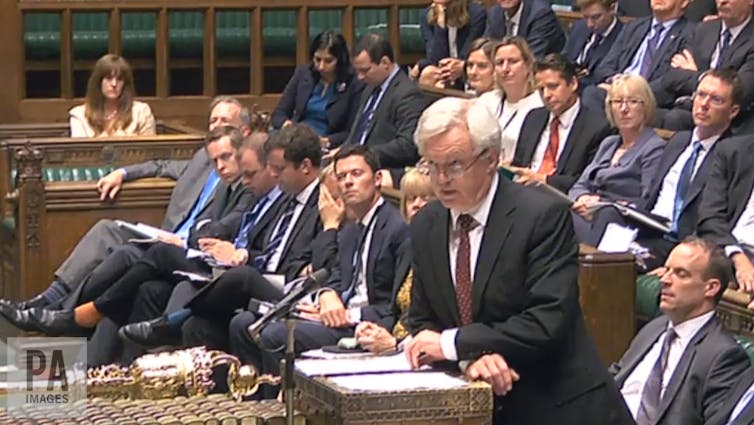As MPs return to parliament after the summer recess, the main item on the parliamentary agenda is the passage of the European Union (Withdrawal) Bill.
Often referred to as the repeal bill, this piece of legislation will officially repeal the European Communities Act of 1972 and will incorporate EU laws onto the UK statute book, ready to be reviewed and potentially changed.
The bill is important not only because it will enable the UK to withdraw from the EU, but also because it will ensure continuity, retaining key EU legislation but incorporating it into UK law.
What happens first?
Parliamentarians have now begun to debate the the bill in the House of Commons on its “second reading”. This is an opportunity for MPs of all parties to debate the bill’s broad principles. And debate is, at this point, all that MPs can really do until they are able to vote at the end of this part of the process.
Although MPs can’t actually change anything about the bill at this stage, the two days of debate for the second reading are important because they’ll give us a taste of what is to come. We’ll have a much clearer idea of each party’s stance on various elements of the bill and of the areas which really concern them. There has already been much discussion of the bill’s lack of clarity on EU citizens’ rights and its impact on businesses.
When will MPs vote on the bill?
There has been a lot talk about how MPs will vote on the bill. That voting will begin at the end of the second reading debate on the evening of September 11. Labour, the SNP and the Liberal Democrats have already said that they will oppose the bill and will therefore be voting against it at second reading.
Labour leader Jeremy Corbyn has put a three line whip in place, meaning he expects Labour MPs to vote against the bill. It would take a brave Labour MP to vote with the government. It’s also an indication of precisely how much the Labour party wants to disassociate itself from the Brexit process.
With May’s post-election government in a minority in the Commons she’ll be reliant on the DUP for the bill to pass its first hurdle. But given this is a flagship bill and the first vote since May struck a cooperation deal with the DUP, we can expect the Northern Irish party to support it.
Votes in parliament can be confusing. Parties who oppose the government’s bill at second reading can put forward a “reasoned amendment” stating their objections to the bill. We need to bear this in mind when we watch the results of the vote. Conservative MPs will be voting in the “aye” lobby to support the bill itself, but they will be voting against the opposition amendment. So a win for the “noes” doesn’t necessarily mean that the bill has been defeated.
How long will the bill be debated in parliament?
When the bill itself has been voted on, MPs will vote on something called a “programme motion”. It sounds fairly dull but it’s actually of great importance for what comes next. The programme motion is basically the programme for the further consideration of the bill – the time limit for further debates on the bill.

It is this programme motion that will decide how many more days will be set aside in the Commons for consideration of the bill and when the scrutiny must stop. Labour‘s Chris Leslie, the former shadow chancellor and all round procedural whizz, has already expressed concern about this matter. The government is keen to get the bill through parliament as quickly as possible, but Leslie reminded everyone that parliament spent five weeks debating the Maastricht Bill back in the 1990s. It will be interesting to see if opposition MPs try to push the government into making concessions here.
Will it pass?
The bill won’t enter its committee stage, during which it is examined in detail, until after party conference season ends in October. While most legislation is looked at by a small group of MPs at the committee stage, as a major constitutional bill, this one will be scrutinised on the floor of the commons.
This means it isn’t a small group of MPs who look at the bill in detail (as happens with most legislation). Any MP will be able to take part. At this stage the bill is scrutinised on what is known as a “line-by-line” basis. Working slowly through the bill, MPs will be able to put forward amendments to change everything from a single word to an entire clause.
We can expect, for instance, a flurry of amendments on the issue of delegated legislation as well as rights for EU citizens. If the DUP stays on board and there are no Conservative rebels, there is little chance that these amendments will be successful. But if Conservatives start to rebel, some amendments could pass. This has happened many times before at committee stage and it’s understood that warnings from the government that Conservative MPs must toe the line have not gone down well on the backbenches.
But it can take time for MPs in different parties to really get a sense of what their colleagues in other parties are doing and to work together to successfully orchestrate a successful vote on an amendment. This is one reason why incorporating more time into the programme motion for the bill could be advantageous to the bill’s opponents. The longer the bill is in committee, the greater the chances for a government defeat.
We can be certain that there’ll be no changes made to the bill until its October committee stage at the earliest. The greater unknown here really is what will happen when the bill moves to the House of Lords. As with the Article 50 Bill from earlier this year, the most difficult challenge for the government could well come from peers.

